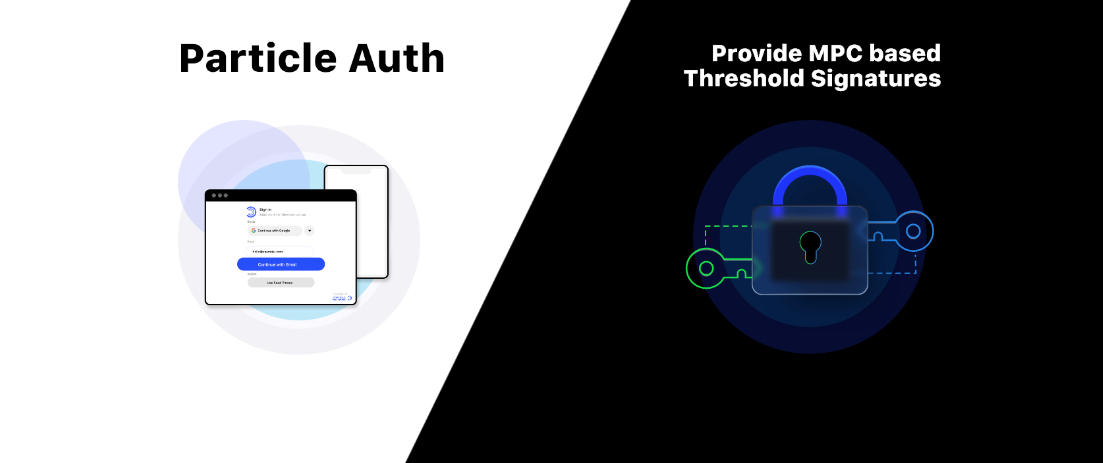Particle 101: MPC-TSS & Social Logins — Seamless Web3 Onboarding for the Next 1B Users

Table of Contents:
Introduction
As the landscape of digital assets and cryptocurrencies continues to evolve, the need for secure and user-friendly wallets becomes paramount. Multi-Party Computation (MPC) and Threshold Signature Scheme (TSS) are emerging technologies that offer a novel approach to security and convenience in the realm of digital wallets. When combined with social logins, these technologies have the potential to transform how users engage with their digital assets.
While another blog post provides a high-level overview of Particle Network, in this article, we will examine the impact of MPC-TSS and social logins on the future of crypto wallets, highlighting Particle's unique approach to key management.

Safeguarding users’ private keys: Particle Network’s key management philosophy
Recognizing the critical importance of private keys in the blockchain ecosystem, Particle Network is committed to ensuring the highest level of security when it comes to private key management. This commitment is reflected in three core principles: exclusive user control, safe account restoration, and elimination of single points of failure. By upholding these principles, Particle Network aims to provide a reliable and secure platform for users to manage their digital assets.
MPC-TSS: Reinventing key management
Building upon this foundation, Particle Network employs MPC-TSS to securely manage cryptographic keys and secrets, delivering a robust, industry-grade solution for key management and protection with the following key security properties:
- Sensitive keys and secrets are divided into two random shares, stored separately by two distinct parties, ensuring that compromising one party does not reveal the key material. Thus there is no single point of compromise.

- Similar to Multi-Sigs, MPC-TSS requires multiple parties to participate in cryptographic operations throughout the key lifecycle without ever combining the two shares, adding an additional layer of security.
- Key shares are regularly updated without altering the actual key, forcing potential attackers to compromise both parties nearly simultaneously to access the key material.
Comparing MPC-TSS with other solutions

To fully appreciate the advantages of MPC-TSS, it’s essential to compare it with other solutions:
- Traditional single private key wallets: These wallets rely on a single private key, which poses a significant risk if compromised. MPC-TSS eliminates this single point of failure by distributing the signing material among multiple parties.
- Smart contract wallets: While offering extensibility and composability, smart contract wallets suffer from increased gas fees (2~4 times higher than ordinary transactions) and potential lack of compatibility across blockchains. MPC-TSS is blockchain-agnostic and doesn’t introduce any additional gas consumption, making it more cost-effective.
- Shamir Secret Sharing (SSS): Although SSS enhances security by dividing a secret into multiple parts, it lacks the advanced cryptographic properties of MPC-TSS. SSS requires the reconstruction of the secret before any operation, potentially exposing it to risks. In contrast, MPC-TSS enables secure computations without revealing the original secret, ensuring higher security and privacy.
Social logins: Streamlining the user experience
One major hurdle faced by newcomers to the world of cryptocurrencies is the steep learning curve associated with managing private keys and wallets. Particle Network introduces a social login feature that allows users to access their accounts using familiar authentication methods, such as Google or Facebook login. This feature enables users to create digital wallets without having to navigate complicated key management processes, simplifying the onboarding experience and promoting wider adoption of cryptocurrencies.
When combined with MPC-TSS, social logins provid both ease of use and enhanced security. Users can manage their secret shares through familiar platforms while benefiting from the robust security offered by MPC-TSS.
Key attributes of Particle Network’s advanced MPC-TSS SDK
Particle Network’s MPC-TSS SDK boasts a set of unique features that set it apart as a secure and user-friendly choice for authentication and digital asset management:
- Exceptionally fast transactions: Users can enjoy ultra-fast transaction execution, ensuring seamless and efficient interactions.
- Broad compatibility: The SDK is built to be chain-agnostic, catering to multiple cryptographic standards, making it adaptable to a variety of blockchain ecosystems. You can check all the available networks here.
- Effortless incorporation: The MPC-TSS SDK is designed for easy integration into any web, native mobile application, or game, offering the versatility and simplicity required for diverse platforms.

- Customisable UI/UX: Various options are offered ranging from composable SDKs to white labelled pluggable widgets, the developers fully owns the autonomy of the user experience of their products.

Conclusion
The combination of MPC-TSS security and social login features offered by Particle Network marks a significant shift in the way digital wallets are designed and used. We highly encourage you to explore and try our MPC-TSS SDK to experience the benefits and features it offers. Visit the official website and access our Docs Center for more information. You can also check out:
Particle Network's Modular Smart Wallet-as-a-Service solutions are 100% free for developers and teams. If you have any inquiries about integrating with us, feel free to book a meeting with one of our agents!
About Particle Network

Particle Network is a Layer-1 blockchain built with the Cosmos SDK, equipped with a high-performance EVM execution environment. It serves as chain abstraction infrastructure for the multi-chain ecosystem, featuring Universal Accounts, Universal Gas, and Universal Liquidity. Through these core functionalities, Particle Network addresses the fragmentation of users and liquidity caused by a growing number of blockchains, coordinating operations across networks and empowering all other chains with enhanced interoperability.
Share this article
About the author(s)


